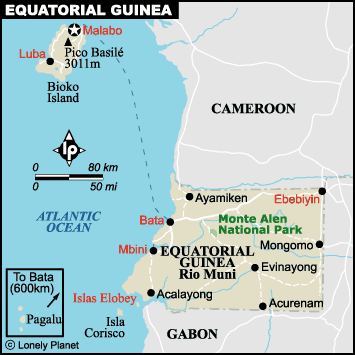Sunday, June 22
Equatorial Guinea: A Few Rich, Many Poor
Agustin Velloso, Counterpunch, June 9, 2003
Last Wednesday, in fact pick any day, in the capital of a small country in Central Africa, a student was about to take a Latin exam, three young lawyers were talking in an office, a boy was drinking water from a public fountain and a public servant was answering the visitor's question by telling him that he had no data on what he wanted to know.
What do such random actions have in common? For one, none of them was doing what he seemed to be doing; also, the cause of their actions was very far from where they were taking place; ...
This took place in the Public Relations and Information Department Office of this country's PNUD, a UN organization, in a developing country that seems to be floating on a pool of oil similar or maybe larger than that of Kuwait. Since the organization responsible for knowing the answer could not respond, the visitor's only resort was attempting to find out the answer on his own. In a case like this, nothing is better than a stroll around the city.

... Why is it that the most foreign-indebted countries, the ones with higher poverty rates enjoying more international cooperation and financial aid, are governed by dictators and have their upper classes settled, together with their money, in the richest and most developed countries?.
The sight of streets covered in mud, the filth of residual water running out in the open, garbage scattered everywhere, the absence of sidewalks barely lit by scarce street lights, the lack of public transportation, banks, road signs or leisure spaces, not to mention libraries, civic centers, book stores, not a sign of urban or any other planning,makes one think that the 500,000 crude oil barrels that are pumped daily (that is assuming that it is not one million barrels, since there are no official figures) in a country with a population below 500,000, do not remain in the country even for a minute; instead they leave the country to enrich someone else. [...]
It seems, then, that the moment has arrived for the formulation of the first law of national economy in Africa: the largest the natural wealth of a country, the lower is the probability that its population is going to enjoy it. Angola and old Zaire are only two egregious examples of this law.
The second law states that the larger the foreign intervention in an African country, mainly via international cooperation, the lower the probability of a sustained development.
Unfortunately, although protagonists themselves, not even the few university students in this country can perceive this.
That is why that student was making huge efforts to pass a subject that is forgotten and relegated to a few specialized centers of higher education in the West, without suspecting that he will never be able to make use of what he has learned, unless it is to exclaim, as the classics did: Homo homini lupus.

